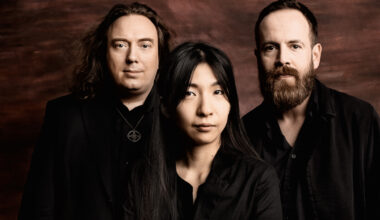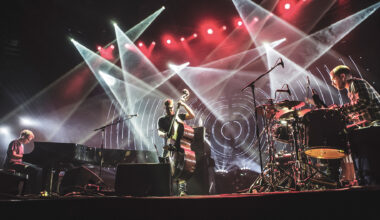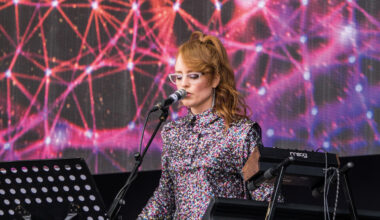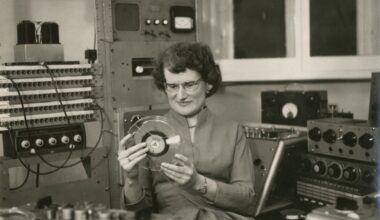Female-fronted synthpop that would have ridden roughshod over the charts in the good old days. Hands up who wants to hear Sheffield’s International Teachers Of Pop?
It’s just minutes into our interview, huddled around a table in a busy Sheffield pub, when the three of them start arguing. Someone’s mentioned Leonore meeting Jarvis Cocker in a cave. Adrian says she was hyperventilating, Dean’s just sitting there smirking, and Leonore’s having none of it.
“I was not hyperventilating,” she protests. “I was really cool, thank you very much. I made him laugh.”
And there’s the moment of combat, as we sip our pints, when I ask how their debut album came together.
“We finished it at the end of my summer holidays,” says Leonore, “then we didn’t see each other again for a while.”
“Yeah, we fell out immediately! She’s really stern,” says Adrian before noticing a reproachful look from Leonore. “Will you stop telling me off!”
I’m on the verge of sending them to see the headteacher, but that metaphor doesn’t ring true. To extend the analogy, this isn’t an out-of-control classroom, they are more like badly behaved teachers, hiding out in the staffroom and arguing over biscuits. The clue’s in the name. Adrian, Dean and Leonore are the International Teachers Of Pop, with CVs that would make the huffiest of Ofsted inspectors doff their cap.
Let me introduce them. Dean Honer is, among others, a member of I Monster and All Seeing I, bands that gave him a clutch of trip hop hits back in the day. He’s a Sheffield-based producer who sits quietly in the corner, dreaming of being back in his studio. Adrian Flanagan is Dean’s partner in The Eccentronic Research Council (featuring actor Maxine Peake as their vocalist) and their Fat White Family mash-up The Moonlandingz. Adrian is an outspoken Salfordian living in Yorkshire, a wonderfully gobby yang to Dean’s yin. And finally, there’s lead singer Leonore Wheatley, who cut her teeth with psych outfit The Soundcarriers and cosmic pop collective Whyte Horses – and is actually a teacher in proper real life in her hometown of Manchester. Surely being in Britain’s newest so-called “nerd disco” outfit is a talking point in the classroom?
“The kids don’t care, to be honest,” she says. “They don’t see you as having a life outside of school, and even if you tell them you’re in bands, it’s never going to be as impressive as the pop stars with a billion hits on YouTube. It’s a completely different culture as to when we were at school.”
Which makes them sound almost Neanderthal – then again, the band did launch their career in that aforementioned cave. The Devil’s Arse is a Derbyshire cavern, so-named because it does “gapeth with a wide mouth” (credit: some 16th century type who really liked caves). It’s also an occasional gig venue, and earlier last year, Jarvis Cocker asked the Teachers to support him for a couple of solo shows.
“It was cold and wet,” says Dean, who’s clearly setting up Adrian for another cynical zinger.
“Really freezing,” agrees Adrian. “As soon as someone mentions stalactites and stalagmites, I’m fucking off.”
“I love all that kind of stuff!” says Leonore, as the other two grin at her attempts to control the gruff producers.
“The changing room was a tiny rock shed. People were looking at us thinking, ‘who the fuck are these people’, but we had a great gig!”
“It went down really well and everyone thought we were dead professional,” deadpans Adrian in an attempt at positivity that makes Dean burst out laughing. “Jarvis was pleased. He’s possibly one of our biggest fans – and one of our tallest and thinnest fans.”
The call for the gig came at short notice, requiring the band to hurry together more than just the couple of tracks they had punted to the likes of BBC 6 Music DJ Marc Riley. Thankfully it was the Easter holidays, so with no pupils to teach, Leonore was available to build some tracks with her bandmates. Suddenly, they had a setlist.
“Things happened so quickly after that,” recalls Leonore. “We supported Go-Kart Mozart in Hebden Bridge, then we had a Marc Riley session, and then our first headline gig in London with Róisín Murphy. Everything got bigger and bigger – the pressure got us off our arse.”

Their sound is a poppier take on any of their pre-Teachers work: a Kraftwerkian disco for an LCD Soundsystem generation. The synths are front and centre, with oodles of buzzing basslines, and a unique lead vocal pairing provided by Leonore and her housemate Katie Mason – more about her later.
“In The Eccentronic Research Council, the songs I write are narrative,” says Adrian. “And with The Moonlandingz, we pick scabs lyrically, so with this we made a conscious decision to do something poppy but credible, without taking the piss too much. Everyone goes on about the Spice Girls being, like, what’s the word…?”
“Famous?” says Dean.
“A guilty pleasure,” continues Adrian. “But they’re not a pleasure because the Spice Girls are all Tories and we don’t really care about them. This is pop music for people who actually like music.”
Dean’s studio is the starting point of most tracks, working in vocals later. “It’s the same gear we use for The Moonlandingz, but there’s no guitars,” says Dean. “We use a lot of Minimoog, and an Oberheim OB-6 for the arpeggiating stuff.”
“Dean Horner, the synth Yoda,” interrupts Adrian.
“We liked the psych 1960s vocals that Leonore did with The Soundcarriers, so we combined that with electronic disco,” says Dean.
One of the results of this sound soup is the robust pop of ‘The Ballad Of Remedy Nilsson’, a caffeinated Human League jam that may, or may not, be about a pet cat.
“It’s about how my cat hates being picked up,” says Leonore, “but the lyrics might not be about a cat: it could be about a loved one.”
“At the end of the second verse, you can hear a miaow – it was her torturing her cat. She stuck a knitting needle up its bottom,” says Adrian, to Leonore’s amused horror.
The influences aren’t just feline. There’s the mid-tempo acidic disco of ‘Love Girl’, inspired by Donna Summer’s ‘I Feel Love’, but easily sitting in the tonal world of the Pet Shop Boys. And the Moroder-ish bounce of ‘After Dark’ is accompanied by a video that feels ‘Misery’-like, with Dean and Adrian’s long-time collaborator Maxine Peake appearing as a doll-brandishing superfan.
Album closer ‘Oh Yosemite’ comes from Leonore’s teacher brain not quite coping with kids trying to name American national parks and pronouncing Yosemite as “yosser-mite”.
“I wrote about different words people mispronounce,” she says, “I taught some girls from my school harmonies and the proper pronunciation of those words, and we recorded them as a choir.”
There’s even a cover version – Pink Floyd’s ‘Another Brick In The Wall’, a track they rustled up as a crowd-pleaser for their cave gig – and because they needed something teacher-themed to match their band name.
“It’s a great cover version,” says Adrian. “I’d say it’s better than the original.”
“Oh, don’t say that! Don’t put that in!” protests Leonore.
Perhaps their signature piece on this self-titled debut album is the lead track, ‘Age Of The Train’, a driving pop tune in which harmonic swells evoke an engine speeding through the rolling British countryside. The cover shows an image of an ancient British Rail locomotive that used to chug commuters between Manchester and Sheffield – a journey Leonore often takes to record with her fellow Teachers.
“I basically live on a train,” she says. “I wanted to write something about how shit train journeys are, and Adrian said, ‘Let’s turn it into a proper dark story’. The Northern Rail strikes have been going on for weeks, but it won’t make any difference if the rest of us are not as angry as we should be.”
“Ever since Leonore started coming over to record with us, we’ve noticed the trains are never on time,” says Adrian. “Northern Rail is shit: it needs dropping off a cliff. If you go to Germany or somewhere, people kick off about a train being 30 seconds late. Why doesn’t that happen here? People should be launching sheep at trains.”
Before you get too caught up in the giddy possibilities of a livestock trebuchet, you may notice something has happened here. The band is agreeing. Throughout the interview, the lads have been quick to tease their singer. “I like fresh talent, but we ended up with Leonore,” jokes Adrian at one point, and Dean quips about using a lot of Auto-Tune. But there’s always a glint in their eye, and the sibling-like clowning clearly comes from a place of deep love and respect. It also seems their family is growing, as Katie Mason – the housemate from earlier – steps up from backing vocals to sharing harmonies centre stage with Leonore. At gigs, the women appear at once aloof and yet totally involved, throwing in dance routines such as locomotion poses for ‘Age Of The Train’. It’s a hugely watchable partnership – something on which the band seems utterly united.
“I’ve known Katie for nearly 20 years,” says Leonore. “She understands everything. For example, before Katie got into the band, we were bored one day and we were sick of our bins not being collected on time, so we dressed up in our glad rags for a photo shoot with the bins and sent it to Trafford council. That’s the dynamic we want – people having fun and not taking yourself too seriously.”
“You can’t fake that,” says Adrian, with every sincerity in the world. “It’s a similar dynamic to me and Dean: we’ve known each other for so long.”
“Leonore and Katie remind me of kids dressing up,” adds Dean, “it’s all very natural. I was trying to think of any bands with a similar relationship between the main vocalists: there’s only The Human League or The B-52s where you can see there’s something as genuine going on. It’s something more than just singing in a band.”
The interview is winding to a close. Adrian is off to the bar for a final pint. Dean looks like he’d rather be tweaking some vintage knobs and Leonore is planning her train back to Manchester. Our thoughts turn to their imminent tour of the UK – if Adrian’s on form, the between-song banter is going to be unmissable.
“I absolutely can’t wait,” says Adrian. “Fridge sandwiches, Doritos. I love it.”
“I hate touring,” says Dean. And we’re back. “You’re forced into it because it’s what you have to do nowadays to be successful – unless you get yourself on Radio 1 doing pure handbag pop. At the moment, we’ve got that 6 Music feel with an indie edge – do you spoil it by polishing it up, or do you keep it a little bit scuzzy?”
“I’m all for selling out to be fair,” jokes Adrian. “I’ve been doing this for too long – let’s sell out, get a car, buy a house!”
For a project that mostly relies on Leonore being on her Easter or summer holidays, there seems to be momentum behind the International Teachers Of Pop. A simple project designed as much for live performance as for records, built around a bunch of friends with an entertaining line in comedy arguments. There’s real heart too, best demonstrated by Leonore’s commitment to the children she teaches.
“I am really proud that I can do teaching as well as doing the band,” she says. “On the album cover, there are illustrations from the kids at the school: my teaching life is separate, but it’s incorporated in a way.”
With Leonore’s career as a teacher, and Dean sometimes teaching music production, I wonder if Adrian had leanings towards academia. If he could be an actual teacher, what would he teach?
“Rugby! I like a nice tackle,” he says.
Detention for the lot of them.
‘International Teachers Of Pop’ is released by Desolate Spools






